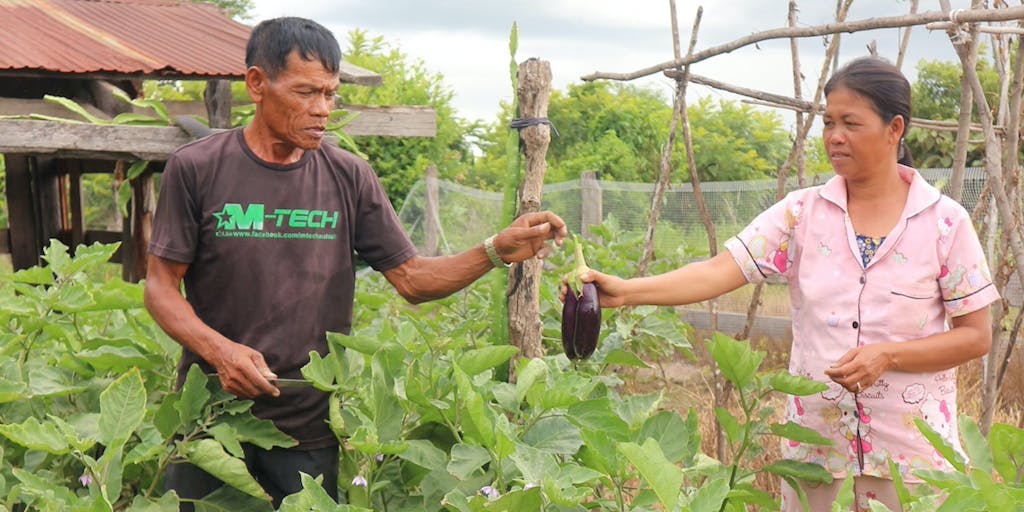The food shortage in Soam’s village left him utterly exhausted.
He worked hard, long hours. Barely a few minutes went by when he wasn’t doing something to support his wife and four sons. But no matter what he did, it never seemed to be enough. He and his family often wondered what they would eat, or, on some days, even if they could eat.
Buying meat and vegetables required most of Soam’s paycheck, yet his children were still hungry. Desperate to satisfy their growling stomachs, he’d scrounge for crabs and snails, even go scavenging the local fields and forests of his community in Cambodia for wild vegetables. But these meals were of poor nutritional value and often led to another problem: Malnutrition meant his family was frequently sick.
Food Shortage Leads to Poor Health
Fever, colic, diarrhea, and other illnesses required medical treatment, putting an even greater strain on Soam’s already strapped budget. Money they intended to spend on food and education now went to pay doctor bills instead.
“I did not have enough time and money to support their studies and provide good meals as well,” Soam remembers. “So almost all of my children dropped out of school to help us earn more to support the family.”
Naturally introverted, Soam turned further inward in his overwhelmed and exhausted state, focusing on his family and their needs. Though his community was banding together to earn extra income and get through the food shortage, he avoided his neighbors and didn’t work with them.
“I also lacked courage,” he shares. “I was too shy to attend the community activities, as well as fearful of engaging the outside community.”
Soam’s story is a clear example of how food shortage contributes to the cycle of extreme poverty. Not only does lacking food and proper nutrition leave children and families hungry, but it also diverts their time, energy, and resources away from education, a child’s key to breaking free from poverty and achieving a brighter future. It also draws them away from opportunities to collaborate with their communities and lift one another up.
But this isn’t the end of the story. The gift of a home garden made a way for Soam, his family, and his entire community.

A Home Garden Changed Everything
Food for the Hungry (FH) provided Soam everything he needed to start a home garden, including seeds to plant, training in how to grow nutritious fruits and vegetables, compost for fertilizer, and so much more.
Now, his family grows their own nutritious food right in their own backyard. Their garden now produces more vegetables than they can eat, so, they sell food at the market to their neighbors and use the profits to:
- Buy meats and other foods they need to round out a healthy diet
- Pay for doctor visits and medicines when they’re needed (far less frequently than before)
- Cover school fees and supplies to send the children to school, where they’ll learn the skills they need to achieve a brighter future.
But the most exciting transformation of all: Equipping this hungry family to feed themselves also helped to build Soam’s self-confidence. Today, he’s a model farmer in his community. Not only does Soam participate in his community’s activities to break free from poverty, he leads them.
“After I became involved with the FH program, I felt very happy and excited to attend those community meetings and various training sessions with FH Cambodia. I gained knowledge of agricultural techniques, and I started to have more ideas to share with my neighbors. I am so happy to see my family changed and my community transformed.”
—Soam

A Family and Community Transformed
When asked what he felt most grateful for in relation to changes implemented with FH’s support, Soam placed his community and his relationships with neighbors at the top of his list. “I am delighted to see my community growing rapidly as they collaborate, build relationships better, and have a better understanding about health issues in daily life, the benefits of home gardening, and the importance of their children’s education.”
“My vision is to see my community’s value in helping one another, no matter what our circumstances or community will be. All of these activities help to improve the capacity of our people to have more knowledge and joint effect on our community transformation plan in the future.”
Continue Reading:
Family Gardens Grow New Life in Guatemala
A Better Life for Children Started with Training for Parents


